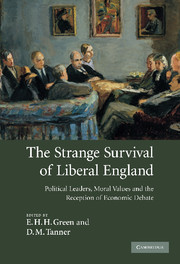 The Strange Survival of Liberal England
The Strange Survival of Liberal England Book contents
- Frontmatter
- Contents
- Acknowledgements
- List of abbreviations
- List of contributors
- Introduction
- Part I Economic ideas and political leaders
- Part II The use and abuse of economic ideas: Keynes and his interpreters
- 5 The Labour party and Keynes
- 6 The Conservative party and Keynes
- 7 Keynesian ideas and the recasting of Italian democracy, 1945–1953
- Part III Economic forces and their significance
- Index
7 - Keynesian ideas and the recasting of Italian democracy, 1945–1953
Published online by Cambridge University Press: 04 July 2009
- Frontmatter
- Contents
- Acknowledgements
- List of abbreviations
- List of contributors
- Introduction
- Part I Economic ideas and political leaders
- Part II The use and abuse of economic ideas: Keynes and his interpreters
- 5 The Labour party and Keynes
- 6 The Conservative party and Keynes
- 7 Keynesian ideas and the recasting of Italian democracy, 1945–1953
- Part III Economic forces and their significance
- Index
Summary
In 1945 the Resistance in Italy was a mass movement which, as Ellwood has written, was ‘explicitly demanding a break with the past and a radical reform of the State and of Italian political development’. The end of the war and the return to democracy was a time of great intellectual and political excitement – ‘never, as much as in this period, were ideas made to prevail upon hard facts’. Notions of social welfare and the planned economy were widely discussed and, to some extent, implemented: in 1945–7 the CIAI (Consiglio Industriale Alta Italia, Industrial Council of Northern Italy) empowered a group of ‘experts’ to manage industrial reconstruction directly, without the help of the Confederation of Italian Industry. In September 1946 a conference on the problem of poverty was held at Tremezzo (Lake Como), with the participation of both economists and politicians. Amongst the latter were Italian officials attached to the United Nations Relief and Rehabilitation Administration (UNRRA). Many delegates expressed impatience with the old doctrine of charity and social paternalism and notions of civic entitlement and a Beveridgean safety net ‘from the cradle to the grave’ were debated. In the same year, Ernesto Rossi, a radical economist, published a book on ‘abolishing poverty’ which voiced Fabian ideas about social redistribution. The Republican Constitution of 1947 reflected this new mindset: one of its drafters, Piero Calamandrei, famously described it as the spirit of the Resistance translated into juridical formulae.
- Type
- Chapter
- Information
- The Strange Survival of Liberal EnglandPolitical Leaders, Moral Values and the Reception of Economic Debate, pp. 212 - 244Publisher: Cambridge University PressPrint publication year: 2007
- 3
- Cited by
